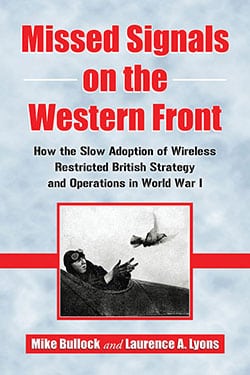Missed Signals on the Western Front
How the Slow Adoption of Wireless Restricted British Strategy and Operations in World War I
Original price was: $39.95.$14.99Current price is: $14.99.
In stock
About the Book
Though wireless communication was in early development during World War I, the technology could have made a profound impact on tactical operations and on the entire strategic conduct of the war. Providing details on how and why the technology did not fulfill its promise as a great military tool until years later, the book points primarily to the British army’s institutional bias against wireless communication as the technology’s downfall, reinforced by the crude, unreliable wireless sets with which the army began the war. It also demonstrates how improved wireless communications between infantry, command, artillery and air observation could have improved the flexibility, accuracy and effectiveness of the British military strategy in the German Spring Offensive, the Hundred Days Counteroffensive and the battles of the Somme, Passchendaele, and Cambrai.
About the Author(s)
Bibliographic Details
Mike Bullock and Laurence A. Lyons
Format: softcover (6 x 9)
Pages: 236
Bibliographic Info: 13 photos, appendices, notes, bibliography, index
Copyright Date: 2010
pISBN: 978-0-7864-4937-8
Imprint: McFarland
Table of Contents
Acknowledgments vi
Preface 1
Introduction 3
1. Military Wireless Before the War 15
2. Operational Signals—Pre-war and Early Mobile Warfare 25
3. Operational Signals—Static Warfare in 1915 34
4. 1915—The RFC Invents Wireless Telephony 53
5. Operational Signals on the Somme 66
6. A Counterfactual—The Somme with Wireless Telephony 76
7. Operational Signals in 1917 87
8. A Counterfactual—Passchendaele and Cambrai with Wireless Telephony 107
9. Operational Signals in 1918 115
10. A Counterfactual—The German Spring Offensive and Hundred Days with Wireless Telephony 141
11. Command, Control and Communications 150
12. Intercept, Encryption and Jamming 167
13. An Assessment of Wireless as It Was Actually Employed 181
Conclusion 192
Appendix A: Wireless Technology 195
Appendix B: Signal Service Units, 1914 199
Appendix C: Signals Service Units Later in the War 201
Chapter Notes 203
Bibliography 215
Index 221
Book Reviews & Awards
“an essential read”—The NYMAS Review.






